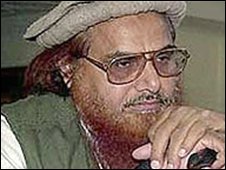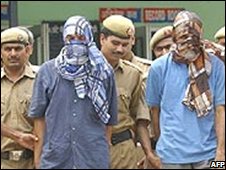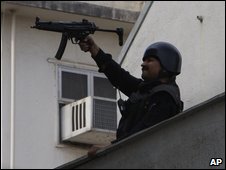Ab-Titchaz
JF-Expert Member
- Jan 30, 2008
- 14,631
- 4,225
Wakuu,
hawa jamaa wa Pakistan ni washari mno.Hebu tizama wanavyowaletea
nyodo India kulingana na haya mauaji ya juzi.
by Claire Cozens Claire Cozens – 3 mins ago

Pakistan Foreign Minister Shah Mehmood Qureshi in Islamabad
ISLAMABAD (AFP) – Pakistan said Tuesday it would not hand over any suspects in the Mumbai bombings to India and warned that while it wanted peace with its neighbour, it was ready for war if New Delhi decided to attack.
The remarks come amid mounting tensions between the nuclear-armed neighbours after India said it is keeping all options open following last month's carnage in Mumbai, where 172 people were killed and more than 300 wounded.
"We do not want to impose war, but we are fully prepared in case war is imposed on us," Pakistan Foreign Minister Shah Mehmood Qureshi said.
"We are not oblivious to our responsibilities to defend our homeland. But it is our desire that there should be no war."
Indian officials say the hardline Lashkar-e-Taiba group, which is based in Pakistan despite being banned by the government, is behind the bloodshed, and Indian media have suggested there could be Indian strikes on militant camps.
Qureshi said he was sending "a very clear message" that his country did not want conflict with India.
"We want friendship, we want peace and we want stability -- but our desire for peace should not be considered Pakistan's weakness."
The minister also said that India's demands for the extradition of suspects in the Mumbai attacks were out of the question and that Pakistan, which has arrested 16 people since Saturday, would keep them on home soil.
"The arrests are being made for our own investigations. Even if allegations are proved against any suspect, he will not be handed over to India," Qureshi said. "We will proceed against those arrested under Pakistani laws."
India and Pakistan have fought three wars since independence from Britain and nearly came to a fourth in 2001 after an attack on the Indian parliament that was blamed on Lashkar-e-Taiba (LeT), which means Army of the Pious.
Under international pressure to act, Pakistan on Sunday raided a camp run by a charity, Jamaat-ud-Dawa, that many believe has close links to Lashkar-e-Taiba, and arrested 15 people.
The charity is headed by LeT's founder Hafiz Saeed.
The LeT has been banned by Pakistan, but India accuses Islamabad of not cracking down on the group, which was established to fight Indian rule in Kashmir and has past links to Pakistani intelligence services and Al-Qaeda.
Saeed on Monday condemned the arrests, saying the Pakistan government had shown "weakness by targeting Kashmiri organisations."
Two of the three India-Pakistan wars were fought over disputed Kashmir, which is controlled in part but claimed in whole by both nations, and the United States in particular has urged calm after the bloodshed in Mumbai.
Pakistan authorities were meanwhile said to be questioning a 16th man, Zaki-ur-Rehman Lakhvi, who was arrested Saturday. Indian media say the lone surviving attacker named him as a key planner behind the Mumbai attacks.
India has said that all 10 of the gunmen who carried out the brazen assault on Mumbai, the country's financial capital, were from Pakistan.
The attackers, some of whom arrived by boat, targeted two luxury hotels, a hospital, a Jewish centre and other sites. They managed to hold off Indian security forces for 60 hours before nine were killed and one was captured.
Referring to the arrests in Pakistan, the United States -- which counts Pakistan as a vital ally in the "war on terror" -- on Monday welcomed what it said were "some positive steps" taken by Islamabad.
[media]http://news.yahoo.com/s/afp/20081209/wl_sthasia_afp/indiaattacks[/media]
hawa jamaa wa Pakistan ni washari mno.Hebu tizama wanavyowaletea
nyodo India kulingana na haya mauaji ya juzi.
Pakistan won't hand suspects to India
by Claire Cozens Claire Cozens – 3 mins ago

Pakistan Foreign Minister Shah Mehmood Qureshi in Islamabad
ISLAMABAD (AFP) – Pakistan said Tuesday it would not hand over any suspects in the Mumbai bombings to India and warned that while it wanted peace with its neighbour, it was ready for war if New Delhi decided to attack.
The remarks come amid mounting tensions between the nuclear-armed neighbours after India said it is keeping all options open following last month's carnage in Mumbai, where 172 people were killed and more than 300 wounded.
"We do not want to impose war, but we are fully prepared in case war is imposed on us," Pakistan Foreign Minister Shah Mehmood Qureshi said.
"We are not oblivious to our responsibilities to defend our homeland. But it is our desire that there should be no war."
Indian officials say the hardline Lashkar-e-Taiba group, which is based in Pakistan despite being banned by the government, is behind the bloodshed, and Indian media have suggested there could be Indian strikes on militant camps.
Qureshi said he was sending "a very clear message" that his country did not want conflict with India.
"We want friendship, we want peace and we want stability -- but our desire for peace should not be considered Pakistan's weakness."
The minister also said that India's demands for the extradition of suspects in the Mumbai attacks were out of the question and that Pakistan, which has arrested 16 people since Saturday, would keep them on home soil.
"The arrests are being made for our own investigations. Even if allegations are proved against any suspect, he will not be handed over to India," Qureshi said. "We will proceed against those arrested under Pakistani laws."
India and Pakistan have fought three wars since independence from Britain and nearly came to a fourth in 2001 after an attack on the Indian parliament that was blamed on Lashkar-e-Taiba (LeT), which means Army of the Pious.
Under international pressure to act, Pakistan on Sunday raided a camp run by a charity, Jamaat-ud-Dawa, that many believe has close links to Lashkar-e-Taiba, and arrested 15 people.
The charity is headed by LeT's founder Hafiz Saeed.
The LeT has been banned by Pakistan, but India accuses Islamabad of not cracking down on the group, which was established to fight Indian rule in Kashmir and has past links to Pakistani intelligence services and Al-Qaeda.
Saeed on Monday condemned the arrests, saying the Pakistan government had shown "weakness by targeting Kashmiri organisations."
Two of the three India-Pakistan wars were fought over disputed Kashmir, which is controlled in part but claimed in whole by both nations, and the United States in particular has urged calm after the bloodshed in Mumbai.
Pakistan authorities were meanwhile said to be questioning a 16th man, Zaki-ur-Rehman Lakhvi, who was arrested Saturday. Indian media say the lone surviving attacker named him as a key planner behind the Mumbai attacks.
India has said that all 10 of the gunmen who carried out the brazen assault on Mumbai, the country's financial capital, were from Pakistan.
The attackers, some of whom arrived by boat, targeted two luxury hotels, a hospital, a Jewish centre and other sites. They managed to hold off Indian security forces for 60 hours before nine were killed and one was captured.
Referring to the arrests in Pakistan, the United States -- which counts Pakistan as a vital ally in the "war on terror" -- on Monday welcomed what it said were "some positive steps" taken by Islamabad.
[media]http://news.yahoo.com/s/afp/20081209/wl_sthasia_afp/indiaattacks[/media]


